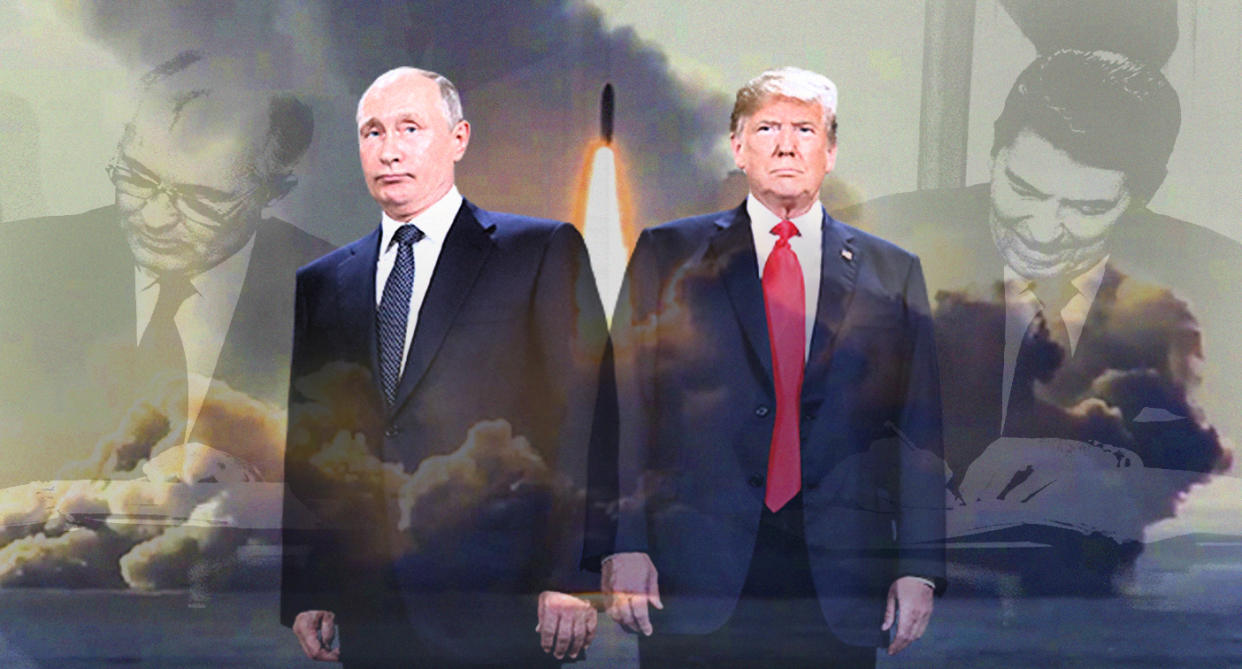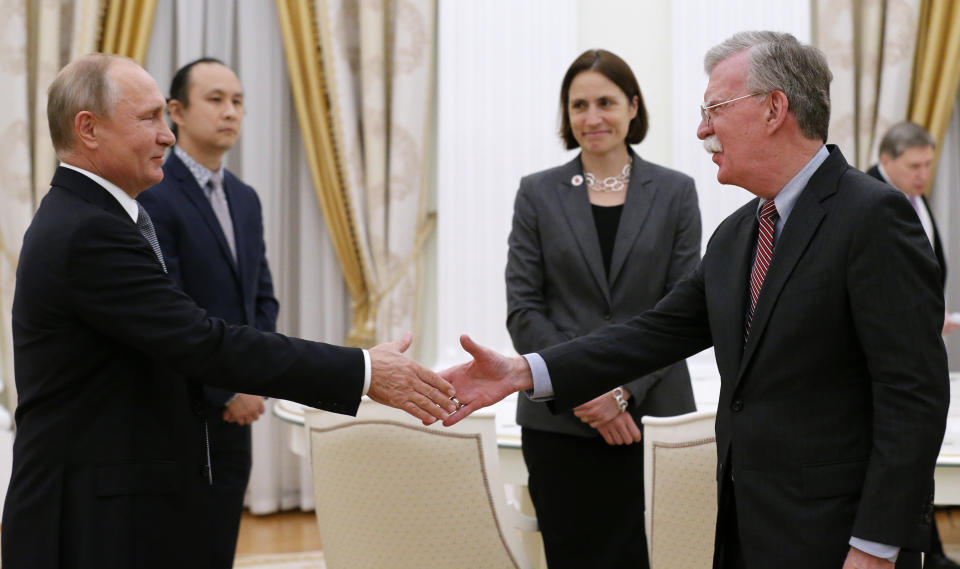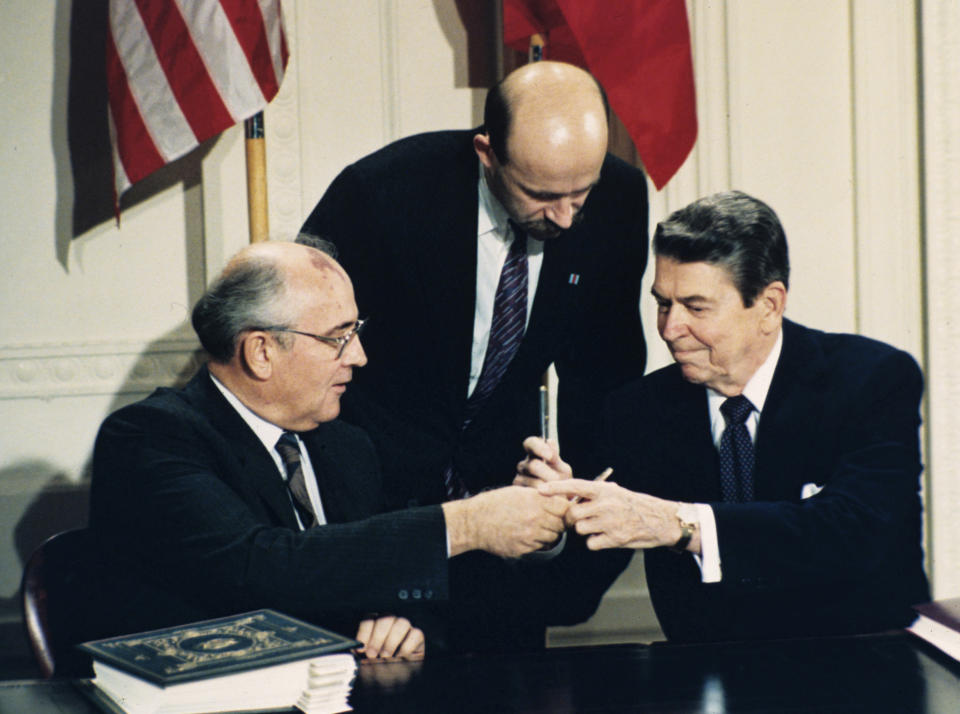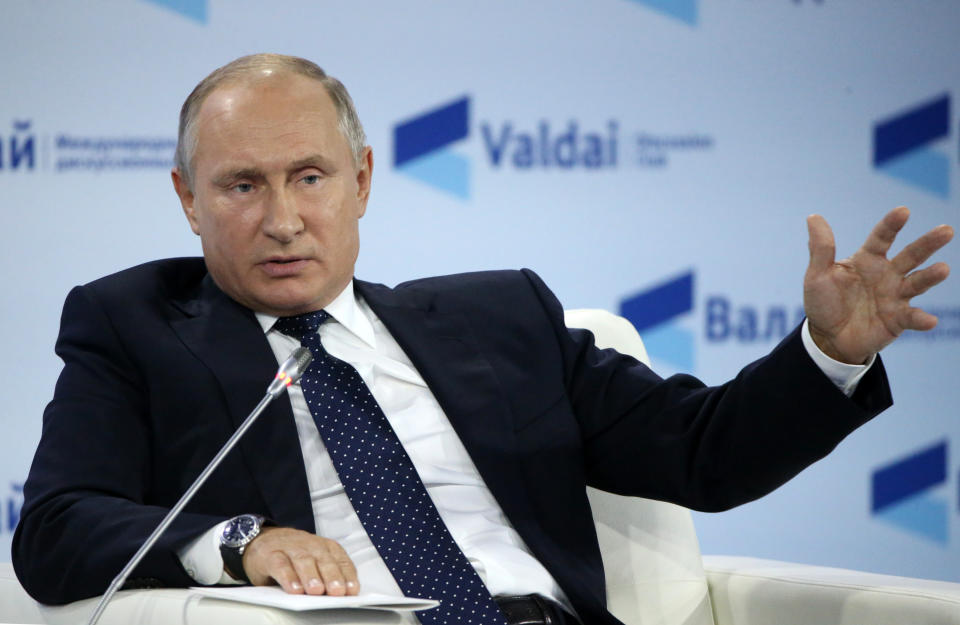Cold War II: Trump threat to pull out of INF Treaty could set off new arms race

When the history of the post-Cold War era is finally written, chronicling the return to Cold War-style animosity and antagonism between Russia and the United States, this week’s apparent decision by the Trump administration to withdraw from the Intermediate-Range Nuclear Forces (INF) Treaty may prove a fateful turning point.
Both sides can cite a long record of grievances. For Russia the turning points in the relationship include the Balkan wars of the 1990s, when NATO sided against the Russian ally Serbia; the steady expansion of the Western military alliance eastward; and efforts to promote democracy that Moscow perceived as meddling in its “near abroad” and internal affairs. The West was provoked by Russia’s return to authoritarianism, its meddling in U.S. and European elections, and above all the rewriting of international borders by military force in Georgia, Crimea and Eastern Ukraine.
Even as the two sides have settled back into well-worn habits of hostility over the past decade, however, they left in place a nuclear arms control regime that protected against the most dangerous excesses of the Cold War. Until now, that is.
“We could spend a lot of time talking about who is to blame for the current state of U.S.-Russian relations, and both sides have their grievances, but we are seeing a steady erosion in trust and cooperation that is pushing us into an era of high risk and potential military confrontation,” former Sen. Sam Nunn, D-Ga., who served as chairman of the Senate Armed Services Committee and co-chairs the Nuclear Threat Initiative, said in an interview. Top U.S. military leaders have recently confirmed to Yahoo News that Russia conducts daily cyberattacks on U.S. military command-and-control systems in Europe, some presumably linked to missile early-warning systems.

“I actually think the chance of a terrible miscalculation involving nuclear weapons is greater today than 10 or 20 years ago, and possibly even worse than during the height of the Cold War,” said Nunn. Despite apparent Russian violations, he said, it would be a serious mistake for President Trump to withdraw from the INF Treaty altogether, a step that would likely be irreversible. The treaty resolved one of the most divisive issues between the U.S. and its allies until the present day: public opposition to basing American nuclear missiles in Europe. “We could end up with the worst of both worlds: Russia having a free hand to deploy unlimited intermediate nuclear forces ranging Europe, and the United States finding that our NATO partners are unwilling to deploy our intermediate weapons on their soil,” said Nunn. “That’s why I don’t see any strategy that would justify terminating the INF Treaty at this time.”
After announcing his decision to withdraw from the treaty at a political rally this week, President Trump sent national security adviser John Bolton to Moscow to explain the move, choosing as his emissary an uber-hawk who has made a career out of opposing arms control treaties and multilateral agreements that he views as undue constraints on U.S. military power. Having fought against arms control agreements and nuclear threat reduction efforts in the George W. Bush administration, Bolton is now targeting a pillar of the arms control regime. After meeting with President Vladimir Putin yesterday, Bolton rejected Russian appeals to preserve the agreement, which he described as outdated and “a Cold War bilateral missile-related treaty in a multipolar ballistic missile world.”
Signed by President Ronald Reagan and Soviet leader Mikhail Gorbachev in 1987, the INF Treaty was the first arms control agreement to eliminate a whole class of weapons, and actually reduce rather than limit nuclear arsenals. After the treaty entered into force, the two sides destroyed 2,692 intermediate missiles, considered among the most destabilizing because their relatively short range, from roughly 310 to 3,400 miles (500 to 5,500 kilometers), meant they could reach their targets in under 10 minutes, which required both sides to keep their arsenals on a hair trigger. Passage of the INF Treaty also prepared the ground for the 1991 START (Strategic Arms Reduction Treaty) that ultimately resulted in the elimination of roughly 80 percent of all strategic nuclear weapons.

The INF Treaty has both symbolic and practical importance to American allies. It marked the end of the Reagan administration’s deployment of intermediate-range nuclear missiles to Europe in the early 1980s, which sparked years of street demonstrations that threatened European governments and nearly split the NATO alliance apart. In breaking with anti-arms control hardliners in their own administrations, both Reagan and Gorbachev also developed the mutual trust that presaged the end of the Cold War just a few years later. Dismantling the treaty would thus be seen by many experts on both sides of the Atlantic as a return to one of the darkest and most dangerous periods of the Cold War.
In a tweet, Germany’s former ambassador to the United States Wolfgang Ischinger said a better strategy would be expanding the INF Treaty to include China, meeting the objection of the U.S. military that it doesn’t cover the growing threat from other nations. “Multilateralizing this agreement would be a lot better than terminating it: beware: no way European allies like Germany could live through another INF [retrofitting] a la 1980s: that road is closed,” tweeted Ischinger, currently the head of the Munich Security Conference. “I am deeply worried!”
Charles Kupchan is a senior fellow at the Council on Foreign Relations and former senior director for European Affairs on the National Security Council. “I think Europeans will be uncomfortable with the Trump administration withdrawing from the INF Treaty, because it will be another sign that arms control has fallen off the U.S.-Russian agenda, and it will represent Trump pulling out of yet another international agreement after withdrawing from the Paris climate accords and the Iran nuclear deal,” he said in an interview. European allies are in general agreement that Russia is violating the INF treaty, he notes, but the bigger question is whether its total demise will provoke further tit-for-tat escalation on the part of the Russians, possibly foreshadowing the collapse of New START when that treaty is up for review in 2021.
“We’re not yet back to an unconstrained nuclear arms race and a remilitarization of the border between NATO and Russia, but we’re creeping in that direction,” said Kupchan, noting that Poland has recently requested the permanent basing of U.S. military forces near its eastern border. “If we’re not very careful, we could wake up one day and find that the situation looks a lot like it did during the Cold War.”

The problem for the Trump administration and U.S. military planners is that Putin already seems to be operating from a zero-sum Cold War mindset. Speaking at the Valdai forum in the Black Sea resort town of Sochi last week, Putin gloated that the days of the United States global “hegemony” are numbered, hastened by a string of mistakes “typical of an empire.” “Thank God, this situation of a unipolar world, of a monopoly, is coming to an end,” Putin said. “It’s practically already over.”
According to top U.S. military officials, Putin is trying to hasten what he sees as the decline of the West with a hybrid destabilization campaign, conducted just below the threshold of outright conflict. “If you look at Russia’s cyber and social media activity, their disinformation operations, and their money and support to European organizations and political groups on both ends of the political spectrum, they are doing those things in many European countries,” Gen. Curtis Scaparrotti, NATO’s supreme allied commander, Europe, told me during an interview at a recent NATO summit in Poland. “In my view, they are executing a destabilization campaign based on a strategy that assumes if they can destabilize Western governments it will be to Russia’s benefit. If you look at their military doctrine, that is part of what they call ‘indirect activity.’”
Against that chilly backdrop U.S. officials have watched with alarm in recent years as Russia developed, tested and deployed the SSC-8 intermediate, ground-based cruise missile in clear violation of the INF Treaty. The Obama administration first raised the SSC-8 issue with Moscow in 2013, and in 2016 invoked the INF Treaty’s “Verification Commission” to air complaints. The commission meeting devolved into an exercise in mutual finger-pointing.
Under the INF Treaty the U.S. can still deploy intermediate sea- and air-launched cruise missiles, but the Russian deployment of the new ground-based missile potentially tilted the finely calibrated equation of nuclear deterrence and “mutually assured destruction,” however slightly. According to Bob Woodward’s new book “Fear,” the Russians have also privately warned Defense Secretary James Mattis that they would not hesitate to use tactical nuclear weapons if it came to a conflict with NATO in the Baltics.

“The Russians will try and use the administration’s withdrawal from the INF Treaty to drive a political wedge between the United States and our European allies, but the arms control regime is unraveling because of Russia’s bad behavior, not us calling them on their cheating,” said Thomas Karako, director of the Missile Defense Project at the Center for Strategic and International Studies (CSIS) in Washington, D.C. “For years we have deluded ourselves that just one more concession on U.S. missile defense might convince Russia to come back into INF Treaty compliance, and for years Russia has continued to violate the treaty and invade its smaller neighbors. Allowing Russia to get away with its continued blatant treaty violations would have a corrosive effect on the faith democratic peoples have in international agreements and their own institutions.”
Advocates point out that issues of treaty verification have played out over many years in the past, even as the nuclear arms control regime was constructed, over time eliminating the vast majority of nuclear weapons. For instance, Reagan, who insisted on “trust but verify” when it came to arms control, complained that a Russian radar at Krasnoyarsk violated the 1972 Anti-Ballistic Missile Treaty. That did not stop him from negotiating the 1987 INF Treaty with Mikhail Gorbachev, who eventually dismantled the radar.
“The INF Treaty has been a success story, and killing it will encourage Russia to deploy many more missiles targeting Europe, while not convincing a single European ally to base our nuclear missiles on their soil as a counter. Tell me how that makes us safer?” said Joseph Cirincione, president of the Ploughshares Fund and a longtime arms control advocate. “You know, most Americans living today have no memory of the nuclear weapons scares and flare-ups of the Cold War. They’ve forgotten what a real arms race looks like, but stay tuned: They may be about to experience it for themselves.”
James Kitfield is senior fellow at the Center for the Study of the Presidency & Congress and the author of the recent book “Twilight Warriors: The Soldiers, Spies, & Special Agents Who Are Revolutionizing the American Way of War” (Basic Books).
_____
Read more from Yahoo News:
Red-tide awakening: How Florida’s environmental woes could hurt Rick Scott
Khashoggi friend says journalist angered Saudi government with column
Rand Paul and Dana Rohrabacher are doing Russia’s bidding, Bill Browder says
Georgia’s fraught history with ‘outsiders’ shapes a tight governor’s race
Photos: Violence, poverty and politics: Why Hondurans are escaping to the U.S.
Photos: Honduran migrant caravan pushes north toward the U.S.


